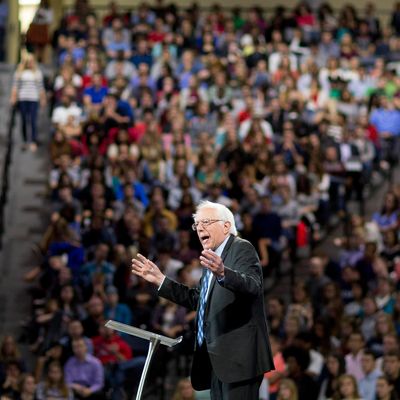
It’s no surprise that Bernie Sanders’s address at Liberty University in Virginia earlier today is getting a lot of attention. Sanders, after all, is a socialist, and Liberty is known for being one of the most conservative Christian colleges in the country — as their student conduct code reveals, music with “lewd lyrics, anti-Christian message, sexual content, nudity, pornography, etc.” is banned outright, and if women wear dresses or skirts to class, they can’t be any higher than two inches above the knees. Naturally, “sexual relations outside of a biblically ordained marriage between a natural-born man and a natural-born woman are not permissible at Liberty University.”
Because Bernie Sanders is Bernie Sanders, he “spent most of his 27-minute address focused on wealth inequality,” as CNN put it. But the event, delivered to a capacity crowd of almost 12,000, dipped into even more controversial subjects as well:
It was during the question-and-answer portion when the crowd was the most enthusiastic. David Nasser, the university’s senior vice president for spiritual development, asked Sanders directly to “reconcile” his view that he wants to safeguard the most vulnerable without protecting “the child in the womb.” A deafening applause erupted for more than 20 seconds.
But Sanders, in his typically stern tone, didn’t shy away and gave a vigorous defense for his views on abortion rights.
“I do understand and I do believe that it is improper for the United States government to tell every women in this country the very painful and difficult choice she has to make on that issue,” Sanders said. “And I honestly, I don’t want to be too provocative here, but very often conservatives say, ‘Get the government out of my life, I don’t want the government telling me what to do.’”
A small section of the crowd cheered in support of Sanders.
No one should mistake this for a group of conservative students eagerly flocking to hear a dissenting voice — attendance was mandatory for everyone who lives on campus, and this is not a school where protesting is welcome.
But it’s still interesting to put this event in context, given what some other university students have done when faced with controversial speakers or events. For example, Emily Yoffe, who has written about the connection between alcohol and sexual assault, had a speaking offer at a West Coast college rescinded after a student organization told her that her presence would make victims of assault “feel unsafe.” And at my alma mater, the University of Michigan, a showing of American Sniper was canceled (though later un-canceled) after students complained that the movie’s depiction of Iraqi Muslims would make “students feel unsafe and unwelcome.” Unsuccessful attempts to get Bill Maher and George Will canceled as speakers at the University of California - Berkeley and Michigan State, respectively, involved similar arguments about creating dangerous-feeling environments. Sometimes the tactic works, and sometimes it doesn’t, but there’s definitely a trend of students arguing that allowing certain speakers to speak poses an emotional risk to some members of the student body.
Without jumping into the broader debate about political correctness, it’s worth pointing out that, if we’re going to buy the theory that the mere presence of a certain type of speaker on campus creates an unsafe space that expands across that campus, bringing the risk of psychological harm to students, Liberty must have been an incredibly unsafe place today. Many, if not most, of its students, after all, deeply and viscerally believe that abortion is murder. And here was a speaker who didn’t agree with them on that — he was, from their point of view, in favor of mass murder. And yet they let him talk respectfully, they asked him questions, and it seemed like everyone was able to have a civil conversation (albeit a mandatory civil conversation).
As of yet, there are no reports of widespread psychological trauma out of Lynchburg.




